Kakarikis are energetic and lively parrots that require a balanced and nutrient-rich diet to thrive. While commercial pellets provide essential vitamins and minerals, it’s essential to incorporate fresh fruits and vegetables into their diet. Berries are a delicious and nutritious addition to Kakarikis’ diet and offer numerous health benefits. This article will explore the best and safest berries for kakarikis to consume.
Berries are a rich source of antioxidants, vitamins, and minerals that can improve kakarikis’ overall health. They also contain dietary fibre, which helps regulate digestion and maintain a healthy weight. However, choosing the right type of berries is crucial to avoid any potential health risks.
Key Takeaways:
- Kakarikis require a balanced and nutrient-rich diet to stay healthy and active.
- Berries are a delicious and nutritious addition to their diet.
- Berries contain antioxidants, vitamins, minerals, and dietary fibre.
- Choosing the right berries is crucial to avoiding any potential health risks.
Incorporating Berries in Kakarikis’ Diet
Kakarikis require a balanced diet to maintain their health and well-being. Berries are an excellent addition to their diet, offering numerous nutritional benefits. Berries are packed with vitamins and minerals that help maintain a healthy immune system, skin, and feathers and promote good vision.
When introducing berries to your kakariki’s diet, start small and monitor their reaction. Berries should not be their primary diet source but rather an occasional treat offered in moderation. Introduce different types of berries gradually, giving your kakariki’s digestive system time to adjust to the new food.
When selecting berries for your kakariki, choose fresh, ripe berries that are free of mould and pesticides. It is also crucial to wash the berries thoroughly before feeding them to your kakariki. Although berries are a healthy addition to a kakariki’s diet, some varieties may not be suitable for consumption. Always check with a veterinarian or avian expert before introducing new foods to your kakariki’s diet.
Berries can be given to kakarikis in several ways. You can offer them fresh or frozen, mixed with other fruits or vegetables, or as a topping on their regular food. Kakarikis may also enjoy eating berries as a standalone treat, making it an easy and convenient addition to their diet.
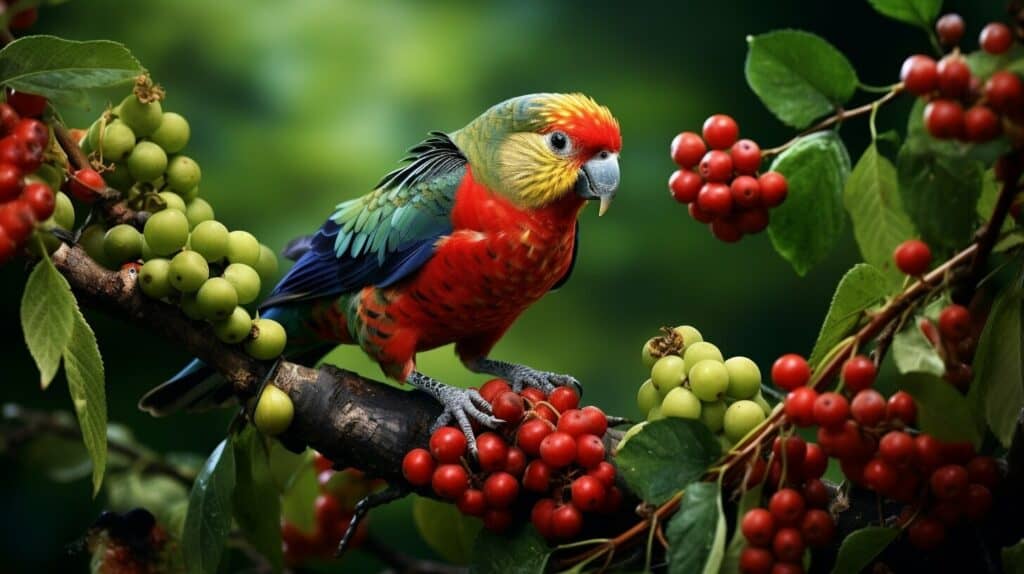
Strawberries for Kakarikis
Strawberries are a delicious and nutritious treat that Kakarikis can enjoy in moderation. They are a good source of vitamin C, folate, and potassium, which can help promote a healthy immune system, brain function, and cardiovascular health.
However, it’s important to note that strawberries should only be given to kakarikis in small quantities due to their high sugar content. The sugar in strawberries can lead to weight gain and other health issues if consumed excessively.
| Nutrient | Amount per 100g |
|---|---|
| Calories | 32 |
| Protein | 0.7g |
| Fat | 0.3g |
| Carbohydrates | 7.7g |
| Fiber | 2g |
| Sugar | 4.9g |
When feeding strawberries to your kakariki, washing them thoroughly and removing the stem and leaves is important. You can treat them or mix them with other fruits and vegetables as part of a balanced diet.
Note: Always consult a veterinarian or avian expert before introducing new foods to your kakariki’s diet.
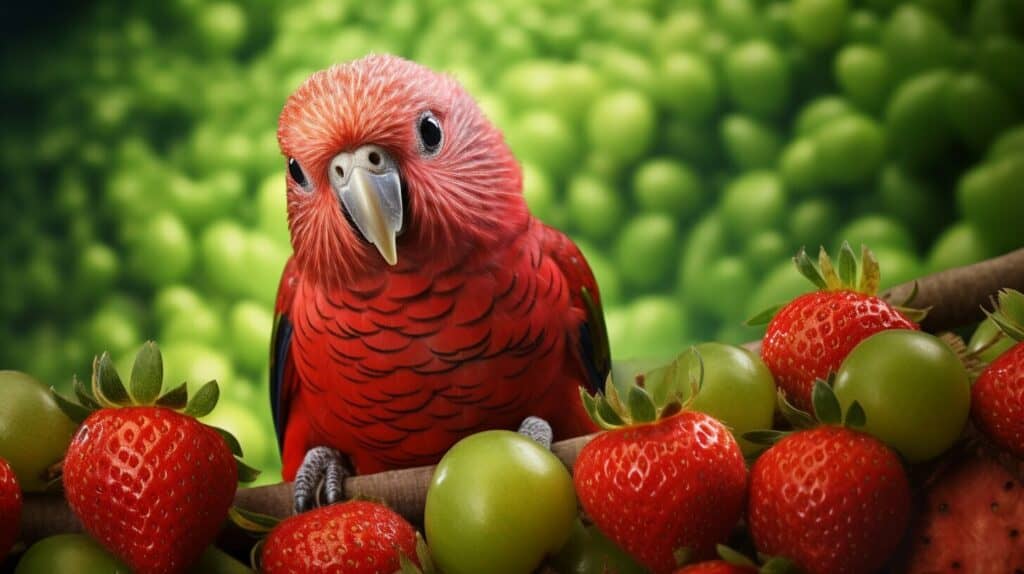
Raspberries for Kakarikis
Another nutrient-rich berry that Kakarikis can consume without risk is raspberries. These berries contain vitamins and minerals, including vitamin C, manganese, and potassium. They also contain antioxidants, which can help shield the body from harm from dangerous molecules called free radicals.
When feeding raspberries to your kakariki, it is important to rinse them thoroughly and remove any stems or leaves. While raspberries are generally safe for birds, some individuals may be allergic to them. As with any new food, it is advisable to introduce raspberries gradually and monitor your bird’s reaction.
| Pros | Cons |
|---|---|
| Rich in vitamins and minerals | Some individuals may be allergic |
| Contain antioxidants | Require thorough rinsing and removal of stems and leaves |
Raspberries can be fed to your kakariki as a treat or balanced diet. They can be mashed and mixed with other fruits or served whole. Remember that berries should make up only a small portion of your bird’s diet and that various other fruits, vegetables, and seeds should also be included.
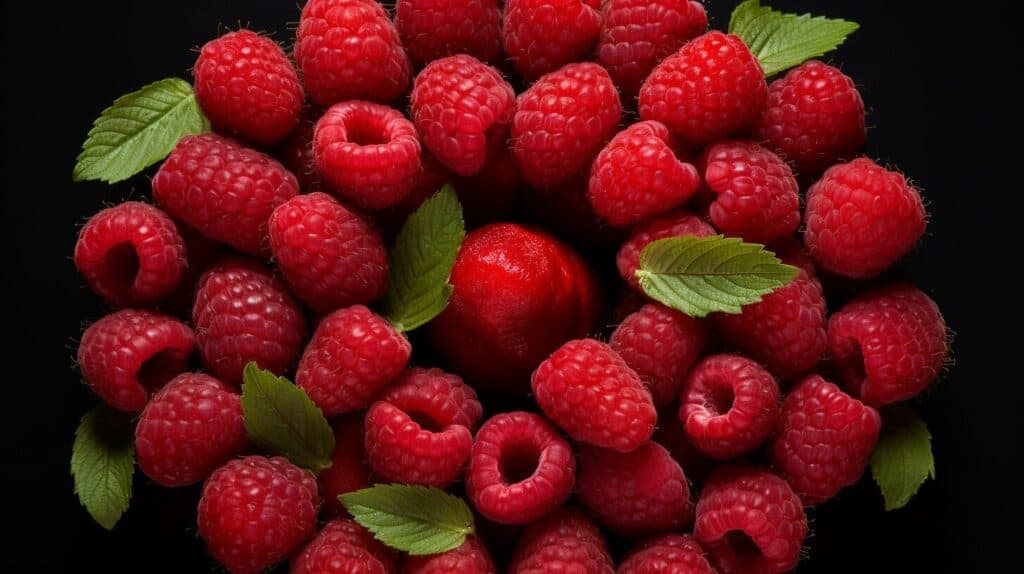
Overall, raspberries are a nutritious and delicious addition to your kakariki’s diet. As with any new food, it is important to introduce it gradually and monitor your bird’s reaction. With proper preparation and moderation, raspberries can be a healthy and enjoyable treat for your feathered friend.
Blueberries for Kakarikis
Blueberries are a nutritious and delicious fruit that can be a great addition to a kakariki’s diet. These berries are a good source of antioxidants, vitamin C, and vitamin K. They also contain fibre and can help promote digestive health in your pet bird.
It is important to note that blueberries should still be given in moderation to your kakariki, as too much of any food can lead to digestive issues. A good rule of thumb is to offer a small handful of blueberries once or twice a week in addition to their regular diet.
When introducing blueberries to your kakariki, starting with small pieces and monitoring their reaction is best. Some birds may not take to new foods right away, so it may take a few tries before they start to enjoy blueberries.
| Nutritional Content of Blueberries | Per 100g |
|---|---|
| Calories | 57 |
| Protein | 0.7g |
| Fat | 0.3g |
| Carbohydrates | 14g |
| Fiber | 2.4g |
| Sugar | 10g |
Overall, blueberries can be a healthy and enjoyable snack for your kakariki. Just be sure to offer them in moderation and monitor your bird’s reaction to ensure they tolerate blueberries well.
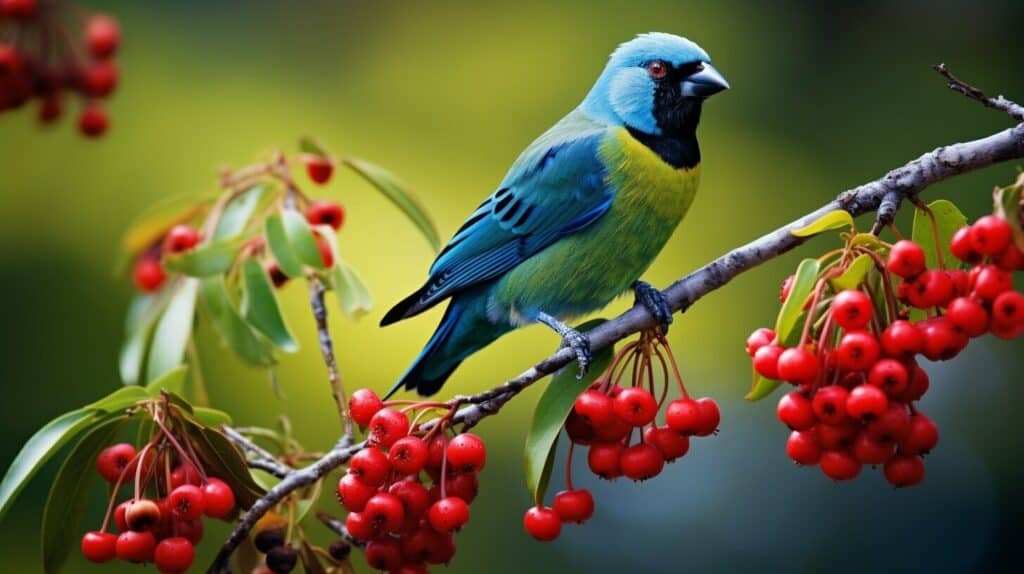
Other Berries to Consider
Aside from strawberries, raspberries, and blueberries, there are other berries that you can safely incorporate into your kakariki’s diet.
Blackberries: These berries contain nutrients such as vitamins C and K, fibre, and antioxidants. They are also low in sugar and can be given to your kakariki as an occasional treat. Make sure to wash them thoroughly before feeding.
Cranberries: Another excellent source of antioxidants and vitamin C, cranberries can help promote a healthy urinary tract in your kakariki. However, they also contain natural acids that can harm their digestive system if given in excess. As with all new foods, introduce them slowly and in moderation.
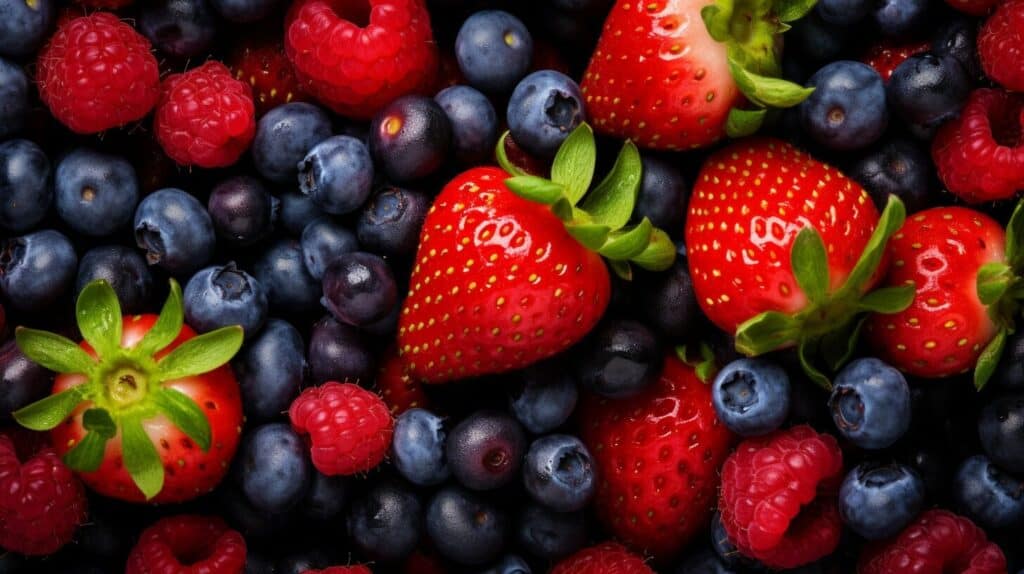
Grapes: Although not technically a berry, grapes are a tasty and healthy treat for your kakariki. They contain antioxidants and vitamins C and K, but remove the seeds and cut them into small pieces before feeding them to your pet.
Raisins: Another grape-derived snack that can be enjoyed by your kakariki in moderation. Raisins are high in fibre and contain vitamins and minerals that can contribute to your bird’s overall health.
Cherries: Cherries are a good source of fibre, vitamins A and C, and antioxidants. They are also low in calories and sugar, making them a healthy addition to your kakariki’s diet. However, remove the pits before feeding, as they can be a choking hazard.
When introducing new berries to your kakariki’s diet, it’s important to start small and observe how your bird reacts. Some birds may have allergic reactions or digestive issues to certain foods, so always monitor them closely. With a balanced and varied diet, your kakariki can enjoy the many benefits of different types of berries.
Conclusion
It is important to remember that a balanced diet is crucial for the health and well-being of your kakariki. Berries can be a great addition to their diet, providing essential vitamins and minerals.
Strawberries are a great option for kakarikis, containing high levels of vitamin C and antioxidants. Raspberries and blueberries are also suitable, offering nutritional benefits such as fibre and vitamin K.
When introducing berries to your kakariki’s diet, starting with small quantities and monitoring their reaction closely is important. It is also important to avoid feeding them any berries that may be harmful or toxic.
Remember:
- Consult a veterinarian or avian specialist before significantly changing your kakariki’s diet.
- Offer a variety of fruits and vegetables in addition to berries for a well-rounded diet.
- Avoid feeding your kakariki any berries that may be harmful or toxic.
By providing your kakariki with a balanced and nutritious diet, including safe and suitable berries, you can help promote their health and well-being for years.
FAQ
Q: What berries can kakarikis eat?
A: Kakarikis can safely eat a variety of berries that are both nutritious and suitable for their diet.
Q: Are berries a healthy food option for kakarikis?
A: Yes, berries are an excellent addition to a kakariki’s diet as they provide important nutrients and contribute to their overall health.
Q: What are the benefits of including berries in a kakariki’s diet?
A: Berries offer a range of benefits, such as essential vitamins, antioxidants, and fibre that help support kakarikis’ well-being.
Q: Can Kakarikis eat strawberries?
A: Strawberries are a kakariki-friendly berry that can be safely consumed. They are rich in vitamin C and other beneficial nutrients.
Q: What precautions should be taken when feeding Kakarikis raspberries?
A: While raspberries are generally safe for kakarikis, they should be provided in moderation due to their high sugar content.
Q: Are blueberries suitable for kakarikis?
A: Blueberries are a nutritious option for kakarikis, packed with antioxidants and other essential nutrients.
Q: What other berries can be considered for kakarikis?
A: Other safe and healthy berries for kakarikis to consume include blackberries and cranberries. These berries offer similar nutritional benefits to strawberries, raspberries, and blueberries.
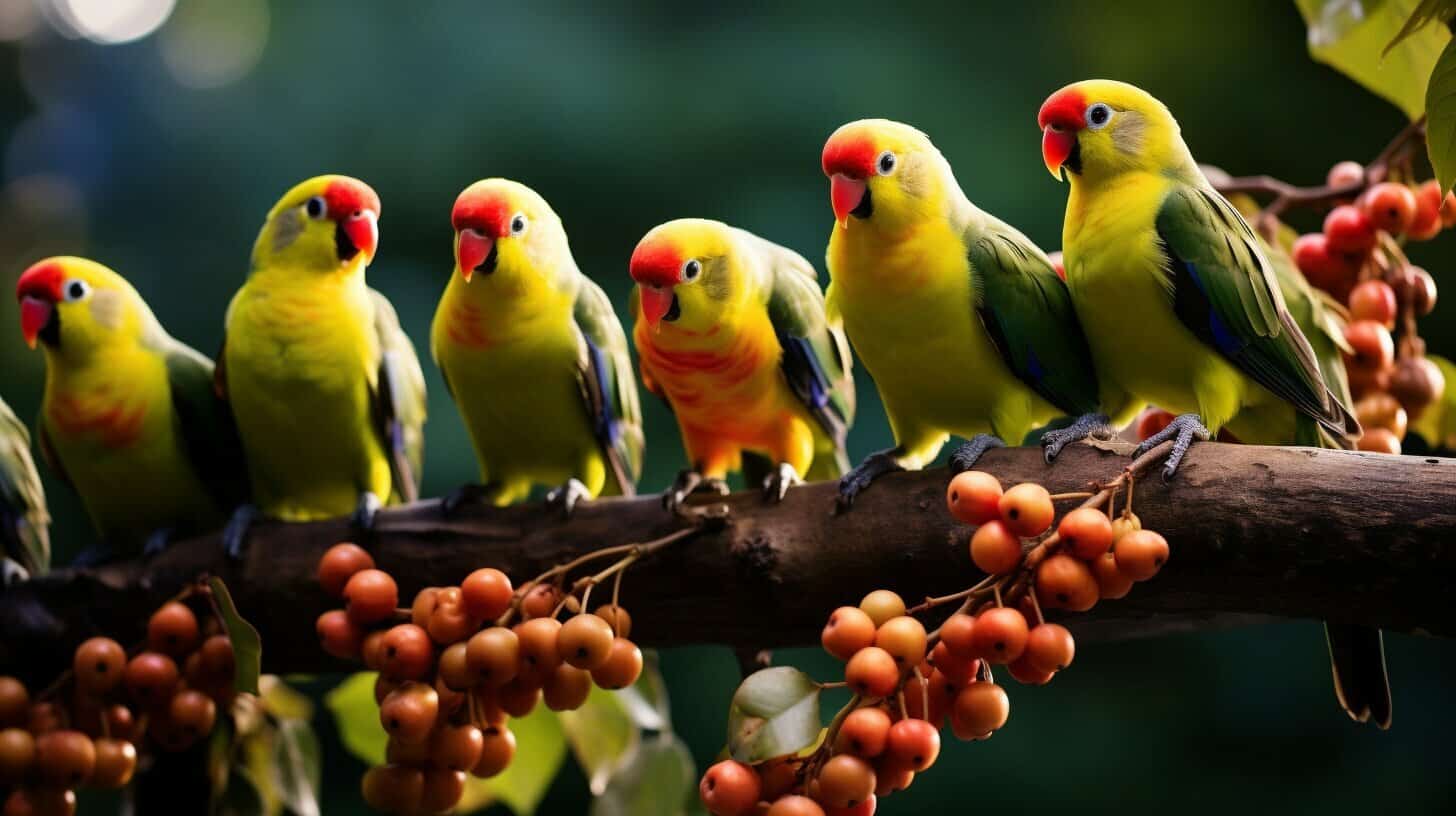


Have comments or questions about this article? Then get involved!
Spotted an error or something we have missed? Let us know